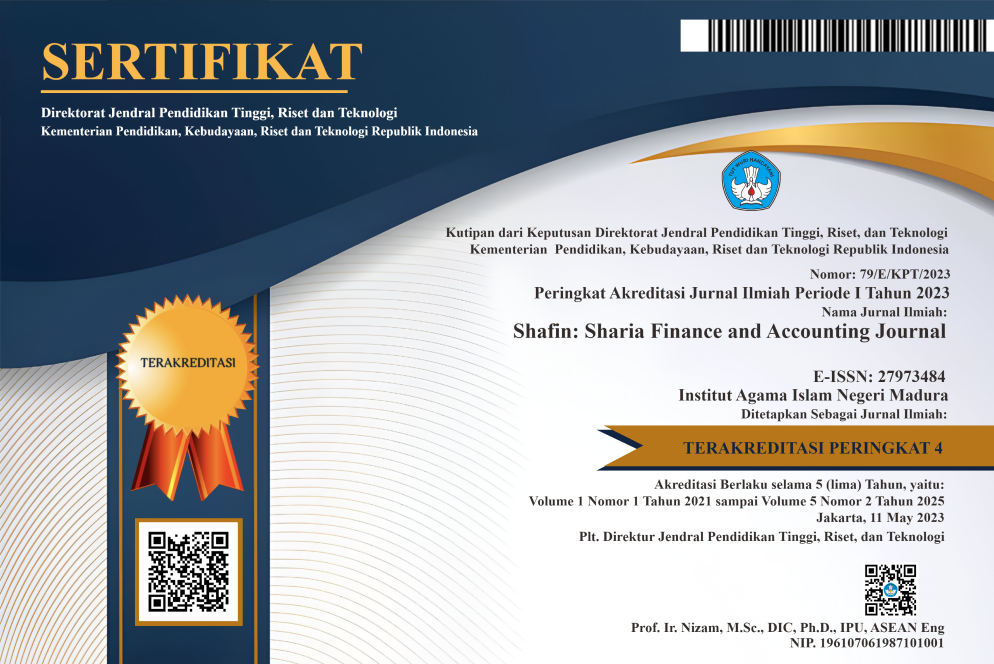Rukun Iman Sebagai Dasar Pengelolaan Keuangan Daerah
 Abstract views: 249
,
Abstract views: 249
,
 PDF (Bahasa Indonesia) downloads: 332
PDF (Bahasa Indonesia) downloads: 332
Abstract
Regional financial management can be carried out economically, efficiently, effectively. By being associated with the pillars of faith to produce accountable and transparent financial management. Local governments must also be able to manage their regional finances to improve and develop people's welfare by carrying out good management. Regional finances are managed in accordance with applicable regulations, managed efficiently, effectively, accountably, transparently, economically and responsibly. The research method used by the author is a qualitative descriptive method, which describes the data collected and analyzed. The subject of this research is the regional finance section, with the object of pillars of faith as the basis for its management. The data source used is secondary data obtained from literature, previous research journals, such as books, magazines, and company document data needed. The results of this study explain that through management of the pillars of faith finance, everyone has responsibility for the actions that have been done in the world, will return to himself. If this principle is believed, it will have a major influence on regional financial management. Everyone will try to do good and be afraid of doing bad, and when he does bad he will immediately repent and realize all his mistakes
Downloads
References
Aladin, K. (2012). Hukum Islam. PT Raja Grafindo.
Bird, Richard M., dan Vaillancourt, F. (2000). Desentralisasi Fiskal di Negara-Negara sedang Berkembang. PT Gramedia Pustaka.
Budianto, A., Vitria, F., dan Y. (2020). Peran Manajemen Sumber Data Manusia dalam Meningkatkan Kinerja Karyawan CV. Mitra Jaya Bersama.
Halim, A. (2008). Akuntansi Keuangan Daerah, Akuntansi Sektor Publik. Salemba Empat.
Hehanussa, S. J. (2015). Pengaruh Penyajian Laporan Keuangan Daerah dan Aksebilitas Penyajian Laporan Keuangan Daerah terhadap Transparansi dan Akuntanbilitas Pengelolaan Keuangan Daerah Kota Ambon. Conference in Business, Accounting, and Management, 2(1), 82–88.
Masruroh, A. (2012). Mengelola Keuangan secara Syariah dalam Rangka Menumbuhkan Good Money Habit.
Mbipi, S. D. P., dan Sumptaky, M. (2020). Pengelolaan Keuangan Daerah dan Good Govermance terhadap Kinerja Satuan Kerja Perangkat Daerah. Accounting and Financial Review, 3(2), 152–158.
Muhammad. (2014). Manajemen Keuangan Syaria: Analisis Fiqih dan Keuangan. STIM YKPN.
Putera, R. E. (2016). Pengelolaan Keuangan Daerah yang Transparan di Kabupaten Tanah Datar dalam Melaksanakan Desentralisasi Fiskal.
Rahardja, E. (2017). Pengaruh Fasilitas Kerja, Lingkungan Kerja Non Fisik dan Kepuasan Kerja terhadap Kinerja Karyawan (Studi pada Pegawai Dinas Perindustrian dan Perdagangan Provinsi Jawa Tengah). 6, 1–11.
Sitompul, A. (2014). Implementasi Kebijakan Pengelolaan Keuangan Daerah. Jurnal Pemerintahan Integratif, 2(1), 97–110.
Yuwono, S. (2008). Memahami APBD dan Permasalahannya (Panduan Pengelolaan Keuangan Daerah). Banyumedia Publishing.
The journal operates an Open Access policy under a Creative Commons Non-Commercial Share-Alike license. All articles published Open Access will be immediately and permanently free for everyone to read and download.
• Creative Commons Attribution-NonCommercial (CC-BY-NC)

Shafin: Finance and Sharia Accounting Journal by http://http://ejournal.iainmadura.ac.id/index.php/shafin is licensed under a Creative Commons Attribution-NonCommercial 4.0 International License.
Based on a work at http://ejournal.iainmadura.ac.id.















